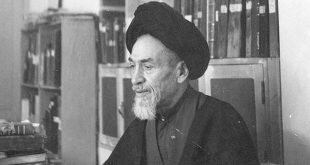
Born
Sheikh Muhammad Mohsin Aqa Bozorg Tehrani was born on 11 Rabīʿa I 1293/6 April 1876, into a mercantile family of Tehran that had strong religious interests; his father, Ḥājj ʿAlī, participated actively in the celebrated tobacco boycott of 1308/1891 and later wrote a book on the history of the movement.
Education
Āqā Bozorg received his initial education from private tutors in Tehran before proceeding to the ʿatabāt in 1315/1897, where he spent the rest of his life, with the exception of four brief return visits to Iran and two short journeys to Syria, Egypt, and the Ḥeǰāz. Among his teachers in Naǰaf were Āḵūnd Mollā Moḥammad-Kāẓem Ḵorāsānī, Sayyed Moḥammad-Kāẓem Yazdī, Sheikh-al-Sharīʿa Eṣfahānī and Ḥājjī Mīrzā Ḥussain Nūrī. He was particularly close to the first of these, working as his amanuensis and assisting in the composition of his major work on feqh, al-Kefāya. On the death of Ayatollah Khorāsānī in 1329/1911, he left Najaf for Sāmarrā to join the circle of Mīrzā Moḥammad-Taqī Shīrāzī. He stayed there until 1354/1935, returning then to Najaf which remained his home until his death.
His Teachers
Muhaddeth Nouri
Sheikh al-Shari’a
Ayatollah Sayyed Muhammad-Kazem Yazdi
Ayatollah Sheikh Muhammad-Taha Najaf
Ayatollah Sayyed Murtaza Keshmiri
Hajj Mirza Hussain Khalili
Akhund Khorasani
Ayatollah Muhammad-Taqi Shirazi
Sayyed Ahmad Tehrani
Sheikh Ahmad Shirazi
Sayyed Aqa Qazvini
Sheikh Abdullah Esfahani
Ayatollah Reza Hamedani
His Students
Sayyed Jamal al-Din EstarAbadi
Muhammad-Reza Hakimi
Muhaqiq Tabatabaei
Sayyed Muhammad-Ali Qazi Tabatabaei
Sayyed Muhammad Mohsin Naqavi
Sayyed Muhammad-Sadiq Bahr al-Uloum
His Scientific Personality
Āqā Bozorg Ṭehrānī’s influence was not limited to the admiration elicited by his decades of industrious scholarship. He exchanged numerous eǰāzāt (licenses of transmission) with the scholars of Hadith, both Sunni and Shiʿite, whom he met in the course of his travels, a practice he consciously sought to revive as vital to the cultivation of Islamic scholarship. He was also widely regarded for his piety and asceticism: He regularly led congregational prayer at several mosques in Najaf, and once a week would walk from Najaf to Kūfa to visit the site of the martyrdom of ʿAlī b. Abī Ṭāleb.
Works
While in Sāmarrā, he conceived, and began to execute, the plan of a comprehensive bibliographical survey of all classes of literature produced by Shiʿite authors. His original intention was to refute a statement by the Christian Arab litterateur, Jorjī Zaydān, belittling the Shiʿite contribution to Arabic letters. However, the survey that Āqā Bozorg produced, al-Ḏarīʿa elā taṣānīf al-shīʿa, went far beyond this polemical purpose to become the main achievement of his career and a major contribution to Islamic scholarship. In al-Ḏarīʿa, the titles of all books written by Shiʿite authors are listed alphabetically, together with a brief indication of authorship and content, as well as place and date of publication in the case of printed works, and location in the case of manuscripts. Āqā Bozorg returned to Najaf in 1354/1935 and established a press (Maṭbaʿat al-saʿāda) to print the first volume of al-Ḏarīʿa, but was soon obliged to sell it. Other arrangements were then made for the printing in Najaf of the second and third volumes, but all subsequent volumes—with the exception of the thirteenth and fourteenth—were published in Tehran. Twenty-two volumes have appeared to date; seven more await publication.
Āqā Bozorg also compiled a biographical dictionary of Shiʿite scholars as a companion to al-Ḏarīʿa. The dictionary has the general title Ṭabaqāt aʿlām al-shīʿa, but each section, pertaining to the scholars of a given century, also has a separate title. Three sections have been published so far: Nawābeḡ al-rowwāt fī rābeʿat al-meʾāt (Beirut, 1390/1970), dealing with Shiʿite traditionists of the 4th Islamic century; al-Kerām al-mobarrara fi’l-qarn al-ṯāleṯ baʿd al-ʿashara (Najaf, 1374-77/1954-57), on scholars of the 13th century; and Noqabāʾ al-bašar fi’l-qarn al-rābeʿ ʿashar (Naǰaf, 1373-88/1953-68), on scholars of the 14th century.
In addition to these multi-volume works, Āqā Bozorg wrote a number of less voluminous books, including a survey of some 600 biographers of Shiʿite traditionists, Moṣaffā ’l-maqāl fī moṣannefī al-reǰāl; a biography of Mīrzā Ḥassan Shīrāzī, Hadīyat al-rāzī ela ’l-moǰadded al-Šīrāzī ; a polemic against Sunni concept of eǰtehād, Tawżīḥ al-rašād fī taʾrīḵ ḥaṣr al-eǰtehād (unpublished); and a defense of the textual integrity of the Koran, al-Naqd al-laṭīf fī nafy al-taḥrīf ʿan al-Qorʾān al-Sharīf (unpublished); and a brief biography of Shaikh Abū Jaʿfar Ṭūsī.
Demise
Grand Ayatollah Aqa Bozorg Tehrani passed away in Najaf on 3March 1970 at the age of 96 and was laid to rest in his own library.
 Ijtihad Network Being Wise and Faithful Muslim in the Contemporary World
Ijtihad Network Being Wise and Faithful Muslim in the Contemporary World
